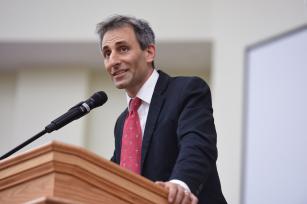
Breadcrumb
- Essential Partners
- Our Impact
- News and Notes
- Talking to Your Kids About the 2016 Election
Talking to Your Kids About the 2016 Election

Recently, while we scootered to get ice cream, my eight-year-old daughter asked me whether our family would move to Canada if a certain candidate won the election. Apparently two of her friends’ families are already planning their escape routes.
After assuring her that our family would not be going anyway no matter who wins the election, we had a long conversation about the nuances of checks and balances. That might seems strange to do with an eight-year old, but the mysteries of how the world works endlessly fascinate her.
I explained how the President cannot pass laws without the approval of the House and the Senate. The House and Senate need a lot of votes to move forward without the President. The Supreme Court ensures nothing enacted is against the Constitution.
Somehow no amount of explanation about the Supreme Court or Congress did much to calm her worries.
I added that if all else fails, the people always have the power to march to Washington—peacefully—and tell our government they cannot do something that the people do not want them to do.
This is how we have ended wars. This is how we demanded for civil rights for all Americans. This is how we have drawn attention to the plight of veterans, the environment, the need for equal treatment of women. I told her how we have done it before and we can do it again. Her face changed—she tuned in.
The idea that she and I could get on a bus and stand in the street—and that it would make a difference—tapped into something deep inside of her. It gave her some agency in a world that I can only imagine seems totally out of her control. After all, she cannot vote, she cannot write letters to the editor, she cannot donate money to campaigns or go to meetings, she cannot even decide what time she goes to bed. She has very little control over her own world.
That she might be able, with her own two feet and her small but mighty voice, to walk to the center of the world’s power and say “no” or ask for a “right” captured her imagination. And that is exactly where I want her imagination—thinking about her own power in the world, how to ask for what she cares about, how to use her voice alongside others.
This is the story we as champions of dialogue and courageous conversation can tell our children and our fellow community members. There is a place for you to be heard. Rather than talking about moving to Canada, let’s talk about how the country needs your participation. The country needs your involvement. You can make a difference if you use your voice.
Our work is to help it be heard in the halls of power, in PTA meetings, in living rooms, in the challenging but utterly necessary conversations we have with each other about who we want to be together.
Especially in this moment of division in our country, we do not need to wait for our government to solve the problems between us—we can and must do that ourselves. And we must not allow the divisive rhetoric of our leaders keep us from reaching out to each other. We must make spaces for each other to hear and be heard—by one another and by our elected officials.
Our work as facilitators is to support those conversations, to make a space for those voices. We can turn our libraries, church basements, coffee shops, museums, living rooms into spaces of reconciliation and renewal. Tell your children that they have a voice and we will make space for their voice to be heard. Tell your children that they are the answer to our world’s problems and to do that, they must be willing to speak up and also to listen.
The world can be a scary place to a child and the answer to some of those fear lies in their ability to make a difference. It is up to us to build a circle for them where they can find their own power, and encounter one another in new and healing ways.
